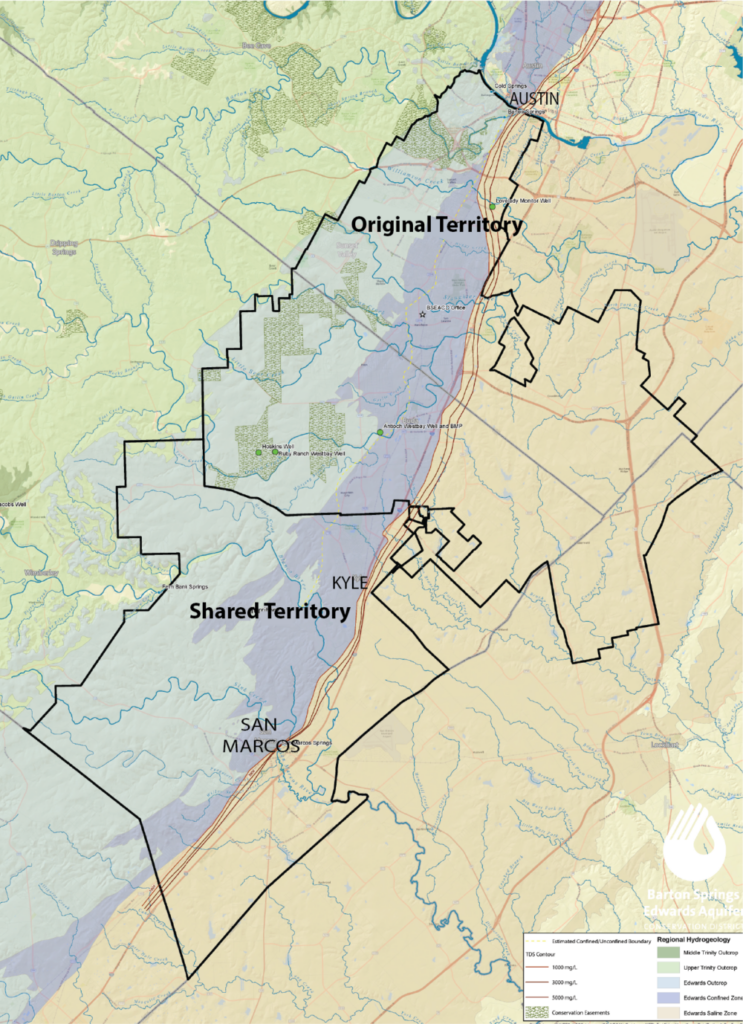Written by Dr. Tim Loftus
The 88th Legislature, Regular Session passed SB 1745 that will take effect on September 1, 2023. The new law allows the Barton Springs/Edwards Aquifer Conservation District (the District) to gradually increase Trinity production permit fees over the next few years to become equivalent to the fee for Conditional Edwards permits. Currently, permittees are charged $0.17/1,000 gallons for a permitted volume of Trinity Aquifer groundwater. The fee will increase ten cents to $0.27/1,000 gallons beginning with new and renewed annual permits issued on September 1, 2023. Each new fiscal year going forward, the fee will increase another ten cents until the production fee for Trinity groundwater matches the Conditional Edwards fee currently set at $0.48/1,000 gallons.
History of the Bill
The territory of the District, initially created in 1987, changed dramatically in 2015. That year, during the 84th Legislature, Regular Session, House Bill 3405 was passed to create the “Shared Territory”. This nearly doubled the area that the District has jurisdiction over wells drilled to produce water.
A last-minute amendment to HB 3405 was added to cap the production fee that could be charged for water “…from any aquifer other than the Edwards Aquifer…” The District was limited to an annual production fee of 17 cents per thousand gallons of water authorized to be produced under a permit from a well for any use other than agricultural. Time ran out on the 84th Legislative Session before the amendment could be debated, and lawmakers agreed to come back in a future session to discuss and remedy the matter. The continuation of this conservation was important because the District’s revenue is fee-based rather than tax-based.
The District was unsuccessful with subsequent efforts to revisit the matter in 2017 and 2021. During one session the fee-equalization initiative passed through the House, but not the Senate, and another session it passed through the Senate, but not the House. Now, eight years after HB 3405 passed, the District has finally achieved a more equitable fee structure. This will help the District better understand the relationship between pumping, rainfall, recharge, and the aquifer water levels along with the potential unreasonable impacts that could occur by granting new production permits.

The Shared Territory
The shared territory created by HB 3405 is overseen by the Edwards Aquifer Authority and the Barton Springs/Edwards Aquifer Conservation District. The Edwards Aquifer Authority continues to manage the use of water from the Edwards Aquifer in the shared territory as it did before HB 3405. The house bill gave the District jurisdiction over the use of water in the Trinity Aquifer in the shared territory in addition to its original boundary- the Barton Springs segment of the Edwards Aquifer. With the expansion of the District’s area along with the considerable population growth and development taking place, there is much work to be performed to improve District understanding of the three layers of the Trinity Aquifer.
What This Means for Barton Springs/Edwards Aquifer Conservation District
House Bill 3405’s limit on Trinity production fees also capped the District’s ability to hire staff, conduct research, and provide the most informed management possible for Trinity groundwater use. The additional fee revenue could help the District expand its staff and/or fund research essential for keeping up with the growing demand for Trinity water.
The District is grateful for Senator Charles Perry (R-28) and his leadership on this initiative. We are also very appreciative of Rep. Dustin Burrows (R-83) who carried the bill in the House.
